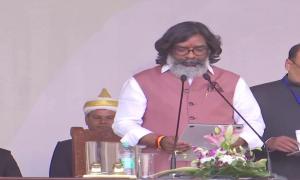Is it a strategic coup that will catapult Dilip Piramal, chairman, V.I.P. Industries onto the global stage? For years he has been trying to break into the bitterly competitive European luggage market. Now, he has snapped up key competitor, UK-based Carlton International, the world's fourth largest moulded luggage maker.
Can Piramal now crack open the European market? Certainly, he's making all the right moves. He has paid a relatively cheap Rs 20 crore (Rs 200 million) for Carlton which had gone into bankruptcy and, in the process outbid moulded luggage giant Samsonite.
Next, he's making cost savings by moving Carlton's plant and machinery to his V.I.P. factory in Nashik. If all goes well, he should soon be positioned to make a fresh assault on the European market. Says Piramal: "Even if we have to initially put in efforts and money towards this, the resultant gains will be much higher."
There are other advantages too for Piramal and V.I.P. Industries. Carlton's equipment and knowhow could come in handy for the company -- also included in the deal are the Carlton's moulds and intellectual property rights.
And, V.I.P., which currently makes around 350,000 pieces of luggage, will boost its capacity by another 80,000 units. V.I.P. was the world's second largest moulded luggage company even before the Carlton acquisition.
But Piramal's problems don't really lie in the European market. He's facing trouble much closer to home. For the last three years the Rs 600-crore (Rs 6 billion) organised luggage market in India has been crawling along on a slow journey to nowhere.
The industry is facing a double-whammy of low demand and stiff competition. The competition is between V.I.P. and global giant Samsonite and the tiny, fast-moving players of the unorganised sector.
Take a look at what global giant Samsonite has been doing. After making a few early missteps, Samsonite has moved quickly to make its presence felt in the market.
As a result, V.I.P., which was the dominant player in India now has only 60 per cent share of the organised market. Samsonite says it has the other 40 per cent. What's worse is that both V.I.P. and Samsonite must share the market with the unorganised sector, which stuffs a large chunk of the market into its cases.
That's why Piramal is looking at other ways to grow. Tapping the lucrative European market where people are on the move more -- and therefore buying luggage -- is one way.
"The opportunity is large, because the market is seasonal and in one season, most players manage to sell three months worth of productions," says Piramal.
Piramal is also debating whether to launch Carlton in India. But that move doesn't seem to worry E P Suresh Menon, executive director, sales & marketing, Samtain Sales (the Indian subsidiary of Samsonite Worldwide).
Says Menon: "We are not very sure what their plans are as far as Carlton is concerned. In any case, we dominate the market globally."
In fact, Samsonite Worldwide was also in the running for the acquisition of Carlton, but it was outbid by V.I.P. "There was no real need for them to acquire it, it would have been more of a blocking strategy," says Piramal.
The all-round pressure in the domestic market has been showing on V.I.P. for some time now. Despite a turnover of Rs 282 crore or Rs 2.82 billion (out of which Rs 45 crore (Rs 450 million) comes from the Moderna range of plastic furniture), profits are a mere Rs 4.59 crore (Rs 45.9 million).
One conspicuous problem is that the company has more than 2,000 employees on its rolls. And analysts say the most worrying part about the balance sheet is that the company's working capital seems stretched.
Agrees Piramal, "We are trying to improve our working capital management and reduce employee costs as well." The company has shut one of its four plants in Jalgaon and announced a voluntary retirement in March, which Piramal says 300 employees have accepted.
Part of the problem is that Samsonite seems to have got its act right. The Rs 170 crore (Rs 1.7 billion) Samtain Sales, has travelled a long way since it set up shop in India in 1997. Initially the bulk of its revenue came from exports, but today the domestic market accounts for 62 per cent of its turnover.
Samsonite's onslaught and range of premium products (accounting for 20 per cent of the organised market with prices above Rs 2,000) forced V.I.P. to respond with ranges like the premium Elanza.
It even opened stores called V.I.P. Lounges, which competed with the franchised Samsonite Travel World. V.I.P. also tied up with French company Delsey to market its premium luggage range but there has been little focus on pushing the range.
"I wasn't comfortable with the idea of selling another company's brand and then we were expecting advertising support for the brand from the parent company which we did not get," says Piramal.
So despite having a premium product range to compete with Samsonite, dealers say the company completely ignored the brand.
"I think the company was worried about the cannibalisation that took place between V.I.P's premium range and the Delsey range," says one Mumbai-based multi brand luggage retailer.
In the meantime even Samsonite realised that the Indian market really belonged to the mid-price segment (in the range of Rs 800 - Rs 2,000), which accounted for roughly 50 per cent of the market. So it introduced the American Tourister range of products for this segment in 2002.
Are exports the answer? Currently, exports account for a mere Rs 15.75 crore (Rs 157.5 million) out of V.I.P.'s Rs 282 crore (Rs 2.82 billion) turnover. Piramal would like that to climb from the current 5.5 per cent of turnover to 15 per cent of turnover by 2006. "We haven't been able to make a significant mark in the European market. Till now," he says.
What else is Piramal doing to make sure that V.I.P. stays ahead of Samsonite? He has taken a new marketing director on board. Sunil Kataria, ex-Marico and ex-Modi Lotteries, is expected to revamp the marketing teams into three independent, focused groups.
Piramal and team have also been in fresh talks with Delsey -- the French company is the world's third largest luggage manufacturer. Now, he says the issues with Delsey have been sorted out and about Rs 5 crore (Rs 50 million) to Rs 6 crore (Rs 60 million), will be spent on pushing the company's product.
"I have to realise the reality and as long as we can take market share from Samsonite, it doesn't matter which of our brands eats into each other," he says.
To tackle the issues with brand dilution the company is looking at hiking its ad budget from the current Rs 16 crore (Rs 160 million) by 20 per cent this year.
But it's going to be an uphill climb for Piramal. Samsonite is upping the ante by focusing entirely on the re-launched American Tourister range this year.
The plan will involve a distribution ramp up as well as a Rs 4.5 crore (Rs 45 million) focused ad campaign. It says that by 2006, it will be the market leader in India. Piramal is unfazed.
"The way I see it, is that today we have three of the top luggage brands under our wing, that can only be advantageous. With increased focus we are bound to do well in the market," he says.







More from rediff